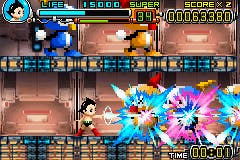Retrospective: Astro Boy Omega Factor
The boy done good.
It's much much more, of course. As a 2D action game by one of the masters of the form, it's also a joy to play, and the confidence with which the world is handled is merely an endearing frame for a canvas splashed with some of Treasure's deftest strokes.
Omega Factor is all-inclusive not just in its extended character roster - as an action game it features cameos from Treasure's rich history; a little of Gunstar, a little of Guardian and there's even enough time to reference lesser knowns with a boss that's crept in from unsung gem Alien Soldier.
Firstly, this is a parallax paradise, a world of aching beauty told in striking 2D vistas. There's Metro City, a futuristic utopia captured under a crisp blue sky, and it's followed up with lush lost civilizations, hulking underwater trains and industrial plants on the surface of the moon.
The real star, quite rightly, is Astro Boy himself, a lead who's had each pixel infused with character. He's lovingly animated, bounding around with a mixture of enthusiasm and menace that gives him the air of a particularly savage toddler.
He's a savage toddler let loose in a playpen packed with vicious toys. Their wide-eyed, boisterous design lends them a charm - the henchmen of Omega Factor seem like the product of a toy factory gone rogue, with killer plushies and snake-headed, bullet-spewing Pez dispensers populating this candy coloured world.

Vanilla enemies, while not particularly smart, impress in their number as well as their scale. It's a scale that fluctuates wildly: Omega Factor happily repurposes its cast, but enlarges or shrinks them on a whim. One screen you'll be batting away a swarm of wasps that seem to be flitting through Astro's fingers, while the next they'll be blown up to screen-filling proportions.
Astro Boy's been given the perfect vocabulary with which to engage them, and he's in possession of a pleasingly diverse move-set. There are ranged options, with a thin finger laser backed up by a meatier, screen filling laser attack that's an EX move, unlocked by filling a small bar at the top of the screen. Fleeting side-scrolling shooter sections place this front and centre, little Gradius-lite levels that cleanse the palate between Omega Factor's principal brawling arenas.
And it's when fists are flying Omega Factor truly shines. As a beat 'em-up, it's defined by the word kinetic, and like Guardian Heroes before it presents a ruckus that's endlessly entertaining. Straight up punches soften Astro's foes, while a kick pings them around the screen, taking out those in their path and turning crowded fights into violent bouts of bowling.
Omega Factor encourages improvisation and experimentation with a scoring system that is, typically for Treasure, nothing short of genius. Multipliers are awarded for combos, and drilling down into Astro Boy's combat reveals a surprising complexity - command chains are long and varied, strung together with EX moves, dashes and cancels.
Another little slice of perfection from Treasure then, and in some ways the end of an era for the developer. Since Omega Factor was released in 2003, Treasure has pre-occupied itself with sequels and remakes - the very same sequels and remakes which, as legend has it, its founder Masato Maegawa said it'd never do. They've been fantastic, thankfully, but going back to the studio's last original game makes you pine for the team to turn back the clock again, and to create something entirely new once more.
